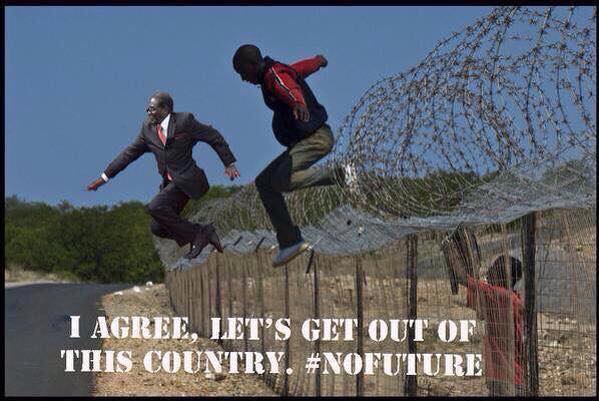- WICKNELL CHIVAYO left school at 15
- DISGRUNTLED Zimbabwe police stage uniform protest.
- MNANGAGWA wife Auxillia drops charges against nine women who boed her in Manicaland
- O.J. Simpson dies of cancer , aged 76.
- South Africa ANC is the cause of ZIMBABWE troubles claims Zimbabwe opposition politician Job Sikhala
S.A Embassy In Harare, Inundated With Zimbabweans fleeing Worsening Economic Crisis.

THE South African Embassy in Harare has their work cut out again as hundreds of Zimbabweans look to escape the country’s worsening economic crisis.
As early at 6.30am, long queues steadily form outside their Belgravia offices. The security guards are in charge until 7.30am when the embassy officially opens. Two South African nationals drive into the carpark and start work immediately even before they switch on their computers. Their task is to sort out the scores of people lined up outside.
Graciously, they call out those who have collection receipts first, then those who are submitting new applications. Next to be allowed in are those who have appeal cases. Lastly, they deal with general enquiries and those who want to collect application forms.
Just a year ago, the embassy was relatively quiet, but today is it a different story. Whenever there is an economic crisis in Zimbabwe, neighbouring South Africa directly feels the heat.
In the recent weeks, Zimbabwe has been rocked by massive job cuts after the Supreme Court ruled that employers can, in fact, terminate employee contracts by giving just three months’ notice. Furthermore, employers are not obliged to pay out a retrenchment package. This has seen over 20,000 people losing their jobs in a space of two weeks, further dragging the already crippled economy deeper in the mire.
The number of Zimbabweans seeking economic refuge in South Africa has drastically increased in recent weeks. The volume of applications at the embassy has been further heightened by the South African government’s decision to have most immigration applications processed in the respective immigrant’s countries.
The Harare embassy had to deploy more staffers to handle the large volume of applications they receive on a daily basis. At the moment, Zimbabweans can enter South Africa visa-free for 90 days a year. Officials at the Harare embassy said most of applications are from those who are applying for the Critical Skills visa, over-stayers’ appeals and student visas.
Almost every other school leaver aspires to study further in South Africa where entrance requirements are much more lenient compared to Zimbabwe universities. There is also a lot more colleges and universities that a broader menu of programmes at affordable fees.
This increase in applications at the embassy is also linked to the Harare passport office that recently got an overhaul and are processing passports faster and more efficiently. Before, the passport office was s shambles, and it would take longer than three months to get a new passport. However, since the overhaul, one can get the green book within a week and with less hassle.
But with South Africa also going through its own economic challenges – power cuts, high crime rates – one has to wonder how all these people are going to be accommodated in a country where the unavailability jobs is a burning issue for the ANC government.
The jobs situation in South African is like a pyramid, heavy at the bottom due to unskilled jobseekers and a leaner top with positions seeking experienced and skilled workforce. These are professional jobs that the majority of Zimbabweans are looking to fill. But as many often find out, the road to get to top is often bumpy and has a lot of hurdles.
The situation in Zimbabwe is almost opposite to that of South Africa. It is not unusual to find a vendor with a university degree in Zimbabwe. As the Zimbabwe tertiary institutions continue to dish out graduates each year, the thin job market is overwhelmed and is failing to fully consume all the skilled people.
Some economists have welcomed the Supreme Court on job cuts as most companies were down on their knees with huge wage bills which they could not sustain. With the absence of a sound social security system, the Zimbabwe government has kept scores of redundant civil servants on the payroll knowing fully well they are not being productive.
It is believed Zimbabwe has close to 500,000 civil servants. In a recent human resources audit, it was revealed that there is a huge number of ghost workers especially in the ministry of education. This has seen the government allocating up to 80% of its budget just for civil servants’ salaries. This is obviously not sustainable for any country, let alone for a small economy like Zimbabwe.
In trying to mitigate the problem of having jobless graduates, the government has directed state training institutions like teachers’ and nursing schools to cut down on their intakes. This has left high school leavers seeking alternative tertiary education in neighbouring countries.
As much as the South African government does not want to admit that a Zimbabwean problem ultimately becomes their problem too; the situation on the ground speaks for itself. There has been a number of diplomatic negotiations between the two countries to try and map out a strategy but they both seem overwhelmed with the situation.
The question begs to be asked; why South Africa? Besides the close proximity to Zimbabwe, it is one of the best economies in Africa and provides that glimpse of hope and a taste of the First World without having to go to faraway shores. The fact that one can hop on a bus and step into ‘First World’ Sandton, South Africa will always remain the destination of hope for most Zimbabweans. source-newzimbabwe